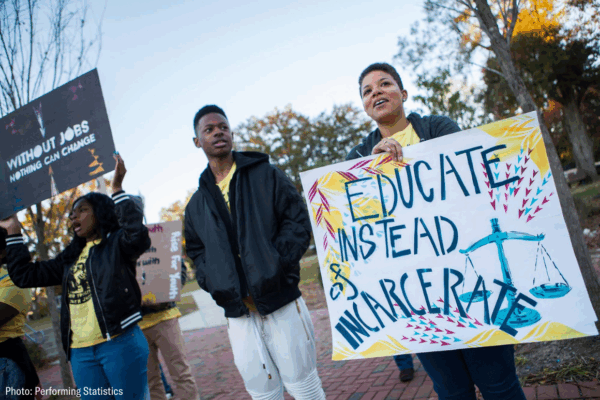By Valerie Slater, executive director, RISE for Youth
Hello, my name is Valerie Slater and I am the executive director of RISE Re-Invest in Supportive Environments for Youth. RISE is a nonpartisan coalition that believes first and foremost that children do not belong in prison. We advocate for juvenile prison closure and for the reinvestment of every dollar allocated for rehabilitation. That those dollars be used within the communities most affected by justice system involvement.
RISE for Youth stands for justice system and prison reform for all affected Virginians. But as advocates for youth, I am speaking up and speaking out about the practice of charging youth as adults and where Virginia provides rehabilitative services for youth committed to the Department of Juvenile Justice’s care.
In Virginia, there are six different avenues to impose adult sanctions on youth as young as 14 years old. Three of these ways are based on either a judge or a Commonwealth Attorney’s discretion. This is very troubling because Virginia’s criminal justice system is, at its core, deeply flawed. You see justice is not blind here. In Virginia the color of a person’s skin, ethnicity and a person’s economic status have proven time and time again to be the greatest determining factors in how justice is hand down, with the most severe sanctions and those most often receiving sanctions fitting into one or mor of the demographics I just mentioned.
Speaking plainly, our prisons in Virginia are disproportionately filled with Black, brown and poor men, women and youth. So, with such a horrific record of discrimination, it is distressing to know that half of the ways our youth end up being prosecuted as adults is at the direct discretion of those who have continued to contribute to their disparate treatment.
But this session, Del. Cole has introduced a bill, HB 274, that raises the age a youth can be tried as an adult from 14 to 16. In a better world we would ideally not prosecute 16 or 17 year olds as adults either and frankly, brain science tells us that a child’s brain is not fully developed until age 25. But this is a step in the right direction.
We also know that the localities with the highest rates of youth prosecution and incarceration are predominately black, brown and poor communities. But something you may not know is that in 2019, robbery and larceny were the charges the majority of youth prosecuted in adult court were facing. Stealing is not right, and it is absolutely wrong to steal from and harm others. But when children are not given the resources they need to thrive, and youth perpetuate the cycles of violence and trauma they have seen and lived in their disenfranchised communities, our response must not be to intensify sanctions but rather to meet the needs.
We must support changing the laws that allow children to be tried as adults, yes, but raising the age of transfer alone is not enough. As we work to rehabilitate our youth who have caused harm, we must ensure that every rehabilitation dollar is used to support our youth in trouble, their families and their communities, because they are all hurting. We must raise the age and pour resources into affected communities. Young people committed to state care need the support of their families and their communities. And affected families and communities need the resources to support their own young people. This session, Del Ward has introduced HB 551 Healthy Communities Secure Care legislation that requires small facilities, 30 beds or less be placed within high committing communities to ensure youth, families and communities heal and grow together.
Charging 14 and 15 year old youth as adults will not increase public safety. But when we treat youth as youth, even when they are in trouble, keep them close to home during rehabilitation and increase resources to support families and communities we create the catalyst to build healthy families and healthy communities.
RISE for Youth asks you to please support HB 274 to increase the age of transfer from 14 to 16 and HB 551 Healthy Communities Secure. Also, visit our website RISE for Youth, follow us on Twitter, Facebook, and Instagram or email us at mailto:info@riseforyouth.org to get more information on how to get involved.
It’s time to heal the hurting and build healthy communities for all youth and families in Virginia!

